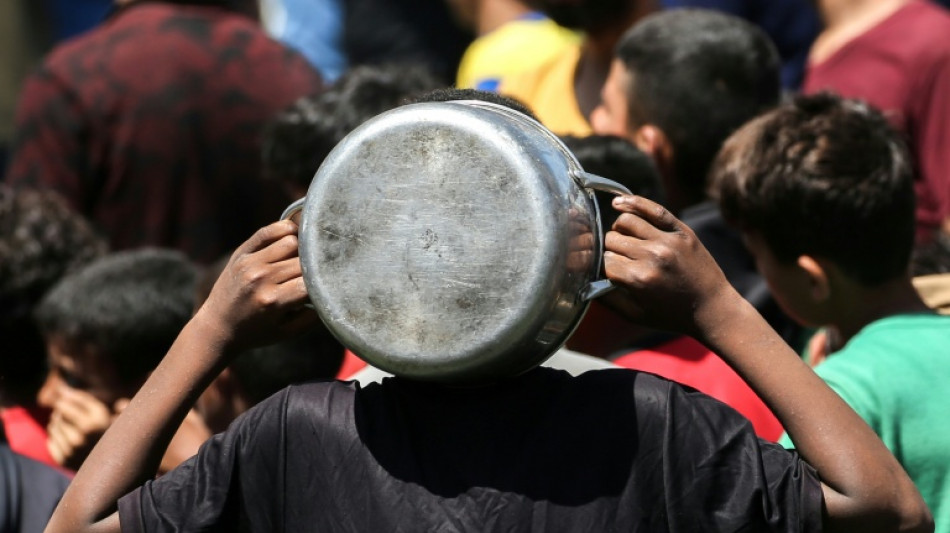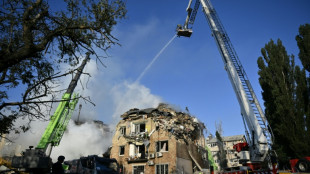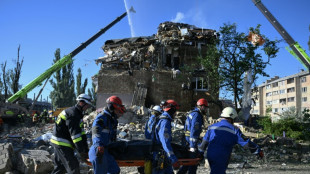
Rescuers say 9 children of Gaza doctor couple killed in Israeli strike

Gaza's civil defence agency said Saturday that an Israeli strike in the southern city of Khan Yunis killed nine children of a pair of married doctors, with the Israeli army saying it was reviewing the reports.
Israel has stepped up its campaign in Gaza in recent days, drawing international criticism as well as calls to allow in more supplies after it partially eased a total blockade on aid imposed on March 2.
Civil defence spokesman Mahmud Bassal said the agency had retrieved "the bodies of nine child martyrs, some of them charred, from the home of Dr Hamdi al-Najjar and his wife, Dr Alaa al-Najjar, all of whom were their children".
He added that Hamdi al-Najjar and another son, Adam, were also seriously wounded in the strike on Friday.
A medical source at Nasser Hospital, where Alaa al-Najjar works, gave Adam's age as 10 years old.
Footage of the aftermath released by the civil defence agency showed rescuers recovering badly burned remains from the damaged home.
Asked about the incident, the Israeli military said it had "struck a number of suspects who were identified operating from a structure" near its troops.
"The Khan Yunis area is a dangerous warzone," it added.
"The claim regarding harm to uninvolved civilians is under review."
The army had issued an evacuation warning for the city on Monday.
The children's funeral took place at Nasser Hospital, AFP footage showed.
Muneer Alboursh, director general of the health ministry in Hamas-run Gaza, said on X that the strike happened shortly after Hamdi Al-Najjar returned home from driving his wife to work.
"This is the reality our medical staff in Gaza endure. Words fall short in describing the pain," he said, accusing Israel of "wiping out entire families".
- Fresh strikes -
Bassal told AFP that Israeli strikes killed at least 15 people on Saturday across Gaza.
He said the dead included a couple who were killed with their two young children in a pre-dawn strike on a house in the Amal quarter of Khan Yunis.
To the west of the city, at least five people were killed by a drone strike on a crowd of people that had gathered to wait for aid trucks, he added.
At Nasser Hospital, tearful mourners gathered Saturday around white-shrouded bodies outside.
"Suddenly, a missile from an F-16 destroyed the entire house, and all of them were civilians -- my sister, her husband and their children," said Wissam Al-Madhoun.
"We found them lying in the street. What did this child do to (Israeli Prime Minister Benjamin) Netanyahu?"
In a statement, the military said that over the past day the air force had struck more than 100 targets across the territory.
Israel resumed operations in Gaza on March 18, ending a two-month ceasefire.
Gaza's health ministry said Saturday that at least 3,747 people had been killed in the territory since then, taking the war's overall toll to 53,901, mostly civilians.
- 'Cruellest phase' -
Hamas's October 2023 attack on Israel that triggered the war resulted in the deaths of 1,218 people, mostly civilians, according to an AFP tally based on official figures.
Militants also took 251 hostages, 57 of whom remain in Gaza including 34 the Israeli military says are dead.
United Nations chief Antonio Guterres said on Friday that Palestinians were enduring "the cruellest phase" of the war in Gaza, where Israel's lengthy blockade has led to widespread shortages of food and medicine.
Limited aid deliveries to the Gaza Strip restarted on Monday for the first time since March 2.
The World Food Programme said that 15 of its trucks were looted late Friday night, calling on Israel "to get far greater volumes of food assistance into Gaza faster".
"Hunger, desperation and anxiety over whether more food aid is coming, is contributing to rising insecurity," it said.
The Gaza City municipality, meanwhile, warned Saturday of "a potential large-scale water crisis" due to a lack of supplies needed for urgent repairs.
It said damage from the war had "affected the majority of Gaza's water infrastructure, leaving large portions of the population vulnerable to severe water shortages".
It added that temperatures were rising and demand was expected to increase.
U.Campbell--SFF

 London
London

 Manchester
Manchester
 Glasgow
Glasgow
 Dublin
Dublin
 Belfast
Belfast
 Washington
Washington
 Denver
Denver
 Atlanta
Atlanta
 Dallas
Dallas
 Houston Texas
Houston Texas
 New Orleans
New Orleans
 El Paso
El Paso
 Phoenix
Phoenix
 Los Angeles
Los Angeles



